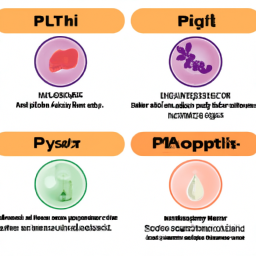Treatment options for H. pylori infection

Different types of H. pylori tests and their accuracy
2023-03-05
Natural remedies for H. pylori infection
2023-03-05Treatment options for H. pylori infection

Treatment options for H. pylori infection
-
Table of Contents
“Say Goodbye to H. pylori with the Right Treatment Option!”
Introduction
Helicobacter pylori (H. pylori) is a type of bacteria that can cause infection in the stomach and small intestine. It is estimated that up to two-thirds of the world’s population is infected with H. pylori. While most people do not experience any symptoms, some may experience abdominal pain, nausea, bloating, and loss of appetite. Treatment options for H. pylori infection include antibiotics, proton pump inhibitors, and bismuth subsalicylate. In some cases, lifestyle changes such as reducing stress and avoiding certain foods may also be recommended. This article will discuss the various treatment options for H. pylori infection.<h3 id=”wpaicg-understanding-the-pros-and-cons-of-different-h-pylori-treatment-options“>Understanding the Pros and Cons of Different H. pylori Treatment Options
Helicobacter pylori (H. pylori) is a type of bacteria that can cause infection in the stomach and small intestine. It is estimated that up to two-thirds of the world’s population is infected with H. pylori. Treatment is necessary to reduce the risk of developing complications such as ulcers and stomach cancer.
When considering treatment options for H. pylori, it is important to understand the pros and cons of each option. The most common treatments are antibiotics, proton pump inhibitors (PPIs), and bismuth-containing compounds.
Antibiotics are the most commonly used treatment for H. pylori. They are effective in eliminating the bacteria and reducing the risk of complications. However, antibiotics can cause side effects such as nausea, vomiting, and diarrhea. Additionally, there is a risk of antibiotic resistance, which can make the treatment less effective.
Proton pump inhibitors (PPIs) are medications that reduce the amount of acid in the stomach. They are effective in reducing the symptoms of H. pylori infection, but they can also cause side effects such as headache, nausea, and diarrhea. Additionally, long-term use of PPIs can increase the risk of certain infections and bone fractures.
Bismuth-containing compounds are medications that contain bismuth, a metal that has antibacterial properties. They are effective in treating H. pylori infection, but they can also cause side effects such as constipation, nausea, and black stools. Additionally, bismuth-containing compounds can interact with other medications, so it is important to discuss all medications with a doctor before starting treatment.
When considering treatment options for H. pylori, it is important to weigh the pros and cons of each option. Antibiotics, PPIs, and bismuth-containing compounds are all effective treatments, but they can also cause side effects and interact with other medications. It is important to discuss all treatment options with a doctor before starting any treatment.<h3 id=”wpaicg-diagnosing-and-treating-h-pylori-infection-what-you-need-to-know”>Diagnosing and Treating H. pylori Infection: What You Need to Know
Helicobacter pylori (H. pylori) is a type of bacteria that can cause infection in the stomach and small intestine. It is estimated that up to two-thirds of the world’s population is infected with H. pylori. While most people with H. pylori infection do not experience any symptoms, it can cause a range of digestive issues, including abdominal pain, nausea, vomiting, and bloating. It can also lead to more serious conditions, such as peptic ulcers and gastric cancer.
If you suspect you may have an H. pylori infection, it is important to seek medical attention. Your doctor will likely order a blood test, stool test, or breath test to diagnose the infection. If the test results are positive, your doctor may recommend a course of antibiotics to treat the infection. This treatment usually involves a combination of two or more antibiotics, such as amoxicillin, clarithromycin, and metronidazole.
In addition to antibiotics, your doctor may also recommend lifestyle changes to help reduce your risk of developing complications from H. pylori infection. These changes may include avoiding alcohol and smoking, eating a healthy diet, and reducing stress.
It is important to take all medications as prescribed and to finish the entire course of antibiotics, even if you start to feel better. If you do not finish the course of antibiotics, the infection may not be completely cured and could return.
If you have been diagnosed with H. pylori infection, it is important to follow up with your doctor to ensure that the infection has been successfully treated. Your doctor may also recommend additional tests to monitor your condition.
By understanding the symptoms, diagnosis, and treatment of H. pylori infection, you can take steps to protect your health and reduce your risk of developing complications.<h3 id=”wpaicg-exploring-the-different-treatment-options-for-h-pylori-infection“>Exploring the Different Treatment Options for H. pylori Infection
Helicobacter pylori (H. pylori) is a type of bacteria that can cause infection in the stomach and small intestine. It is estimated that up to two-thirds of the world’s population is infected with H. pylori. While most people with H. pylori infection do not experience any symptoms, it can cause a range of digestive issues, including abdominal pain, nausea, vomiting, and bloating. It can also increase the risk of developing stomach ulcers and stomach cancer.
Fortunately, there are a variety of treatment options available for H. pylori infection. The most common treatment is a combination of antibiotics and acid-suppressing medications. This combination is usually taken for two weeks and is effective in eliminating the infection in most cases.
In some cases, a single antibiotic may be prescribed. This is usually done if the patient has an allergy to one of the antibiotics in the combination therapy. However, single-antibiotic therapy is not as effective as combination therapy and may need to be repeated if the infection does not clear up.
In addition to antibiotics, other medications may be prescribed to help reduce the symptoms of H. pylori infection. These include antacids, proton pump inhibitors, and bismuth subsalicylate. These medications help to reduce the amount of acid in the stomach, which can help to reduce the symptoms of H. pylori infection.
Finally, lifestyle changes may also be recommended to help reduce the symptoms of H. pylori infection. These include avoiding spicy and acidic foods, quitting smoking, and reducing stress.
In conclusion, there are a variety of treatment options available for H. pylori infection. The most common treatment is a combination of antibiotics and acid-suppressing medications. In some cases, a single antibiotic may be prescribed. Other medications may also be prescribed to help reduce the symptoms of H. pylori infection. Finally, lifestyle changes may also be recommended to help reduce the symptoms of H. pylori infection.
Conclusion
In conclusion, treatment options for H. pylori infection are varied and depend on the severity of the infection. Treatment typically involves a combination of antibiotics, proton pump inhibitors, and bismuth subsalicylate. In some cases, lifestyle changes such as quitting smoking and reducing stress may also be recommended. It is important to follow the treatment plan prescribed by your doctor to ensure the best possible outcome.
If you are suffering from H. pylori infection, don’t wait any longer to get the treatment you need. Visit eTestMedical to learn more about the available treatment options and to get started on the path to recovery.



